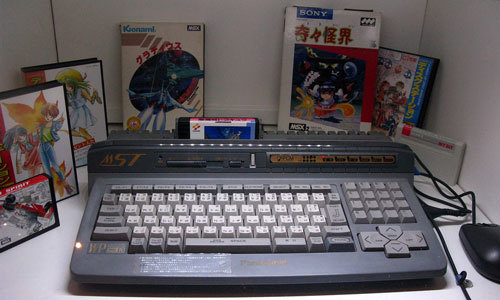
We have written articles in the past year about some of Microsoft's different product launches, like how its first real hardware device was an add-in card for the Apple II, or its not-so-smartwatch platform, SPOT. However, many people may not be aware that Microsoft had a small involvement in a movement to create a standardized PC platform that evolved into a huge video game platform in Japan.
The platform is called MSX, and on October 21, 1983, just over 40 years ago, the first such PC that used the platform went on sale in Japan, the Mitsubishi ML-8000. The launch price for the PC was 59,800 yen or close to $400.
The story of the MSX platform began in Japan several years prior to the launch of that first PC. Kazuhiko Nishi, formed ASCII Corporation in 1978 to publish computer games. He also met with then-22-year-old Microsoft co-founder Bill Gates that same year. The two became fast friends, which led to ASCII becoming the agent of Microsoft in Japan.

Wired reports that, according to Nishi, he was a factor in one of Gates' biggest early decisions at Microsoft:
Nishi was at Microsoft when an invitation arrived from IBM to provide an operating system for a new personal computer. His enthusiasm for the project persuaded Gates to enter a bid. "If I hadn't been there," Nishi says, "ms- DOS would never have happened."
Nishi had big ambitions to create a new PC standard, similar to how VHS hardware became the standard for video tapes. That led to ASCII and Microsoft co-creating the 8-bit MSX standard, which other PC makers could follow in making their own computers.
Many people believe the acronym MSX stands for "MicroSoft eXtended BASIC" which is the programming language that the platform used. Microsoft also developed a version of MS-DOS, called MSX-DOS, for those PCs. Even with that name and software, Microsoft's hands-on involvement in the rise of the MSX platform was reported to be pretty minimal beyond that.
By the way, others believe MSX stands for "Machines with Software eXchangeability" and still others believe it stands for "Matsushita-Sony". It's unlikely this debate will be settled anytime soon.
The first MSX PCs had a 3.58 MHz Zilog Z80 CPU, along with a Texas Instruments TMS9918 graphics chip with 16 KB of dedicated VRAM. After the launch of the first MSX PC in Japan, other makers joined in like Sony, Panasonic, Samsung, and others.
Soon PCs that used the MSX platform dominated sales in Japan. They also sold well in other markets, like South Korea, Argentina, Brazil, Spain, and the Netherlands. However, the platform never took off in the US and other major markets. That prevented MSX from becoming the major platform for PCs which the IBM PC eventually became.
Having said that, the MSX platform's success in Japan led to a number of game publishers releasing some classic titles for those PCs in that country. This week, Xbox Wire has an article on that aspect of the platform. It states:
The MSX quickly earned its reputation as a gaming paradise. Classic titles like Metal Gear, Gradius, and Castlevania found a home on the platform, captivating gamers with their innovative gameplay and unforgettable soundtracks. It was on the MSX that the legendary Konami Code was born, a secret sequence of button presses that would become iconic in the world of gaming.
The MSX platform died out in the early 1990s as the rise of the IBM PC firmly took hold worldwide. However, it still has a cult following, and there are even new games that are made that support MSX. Also, websites like MSX.org have lots of info and resources about the platform. One wonders how the PC industry would have changed if the MSX platform had taken hold in the US like it did in Japan.



3175x175(CURRENT).thumb.jpg.b05acc060982b36f5891ba728e6d953c.jpg)
Recommended Comments
There are no comments to display.
Join the conversation
You can post now and register later. If you have an account, sign in now to post with your account.
Note: Your post will require moderator approval before it will be visible.